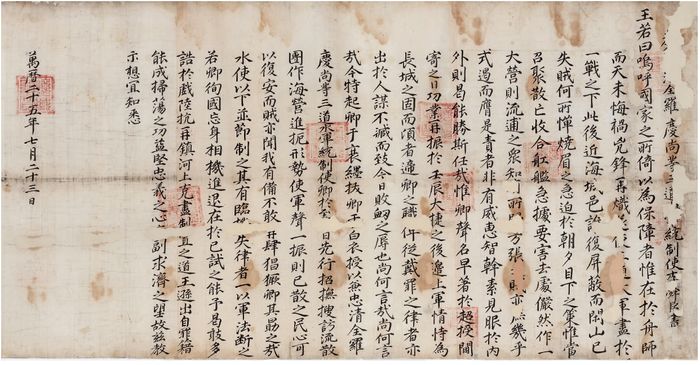(Translation) 御製戒酒綸音
| Primary Source | ||
|---|---|---|
 |
Title | |
| English | Decree Appointing Yi Sunsin to Concurrently Hold the Position of Naval Commander of the Three Provinces of Ch'ungch'ŏng, Chŏlla, and Kyŏngsang | |
| Chinese | 敎 兼忠淸全羅慶尙等三道水軍統制使 李舜臣書 | |
| Korean(RR) | 교 겸총청전나경상등삼도수군통제사 이순신서 | |
| Text Details | ||
| Genre | Royal Documents | |
| Type | Decree | |
| Author(s) | King Sŏnjo | |
| Year | 1597 | |
| Source | ||
| Key Concepts | Imjin War, Yi Sunsin, Japan-Korea Relations | |
| Translation Info | ||
| Translator(s) | Participants of 2016 Summer Hanmun Workshop (Advanced Translation Group) | |
| Editor(s) | Hyeok Hweon Kang, Orion Lethbridge | |
| Year | 2016 | |
목차
Introduction
Original Script
1 1. 臣竊以陛下循祖宗之舊, 特詔近臣, 於科舉之外薦聞天下之豪儁, 許以極言當世之事, 而考察其尤異者, 秩以不次之爵, 待以非常之用, 而天下之豪儁, 亦莫不欣喜自效, 願致於其間. 2. 夫開天下以不諱之門, 納疏賤於至髙之選, 此豈非堯舜之盛德哉? 而臣之不肖, 則獨有所甚憂於此. 何者? 3. 治道本不如是之易言也, 而陛下必以言求之. 使臣而少言之歟? 則略而不足聽, 盡言之歟? 則可以聽而未必信. 4. 而天下之不知者又將强言之, 於是天下之言雜然並進, 而其上莫能擇也, 則一切以爲空言而盡廢之. 夫以有用之學責臣等, 而卒不免以空言廢之, 此非陛下之意也, 而其勢有必然者.
2 1. 盖自慶歴元祐以来, 著而爲書者, 何其衆也! 其於天下之治亂, 軍旅, 錢糓之大計, 常先爲之畫而以意處之者, 何其敢決而不疑也! 其言之多, 思之深, 豈無一二足用於世哉? 2. 而後進之士, 耳剽目習, 以爲言語文字之流, 使之運竒於異說之餘而求夸於陳言之外, 足以敗天下之定勢, 則夫朝廷之上, 於其發謀舉事之際, 而何以爲守! 3. 是故今日之患, 不患人主之不求言也, 而患其求之而不及用, 不患天下之不敢言也, 而患其盡言而無所用. 4. 夫上有寛博無忌之心, 下有慷慨盡言之意, 皆前世之所不及也, 而其効止於若此, 此豈可不爲之深憂其故歟!
3 1. 以臣所論, 士之深識遠見, 卓然特出, 有志於天地君臣之大義, 而務盡其精微以興起一代帝王之業者, 雖以漢唐有國之長, 其間不過數人而已, 況其不少槩見, 而泯没於山巖木石之間者. 此臣所以中夜竊嘆, 廢食忘寢, 以爲陛下幸使因方正之選, 萬一能進於朝, 則其所以稽參成敗之迹而推原當世之故, 宜特發其大意而無至於盡言. 2. 夫廢置更革, 立命造謀, 而出政事於天下者, 天子與大臣之事也, 而疏遠一介之士, 豈得以僭言之, 惟夫居安者不思其危, 習常者不察其變, 見近者或忘於遠, 獨任者或失於人, 計利太卑而求民太甚, 持法愈密, 而爲治愈疏, 至於經國之規, 御世之要, 切近而不爲陋, 宏闊而不爲迂, 盛衰之相因, 治亂之相易, 若此者, 臣皆有以發之. 3. 夫朝廷之上公卿百官所以統天下, 而常患於不能知天下之情; 四海之廣, 南北異俗, 賢愚異慮, 而常患不能通朝廷之意. 上下不合則禍敗出於其中而不知. 4. 故臣以爲誠略發其大意, 見於餘篇而又序其所以發者, 本末如此, 庶幾無猖狂驚世之論, 豫定必然之謀, 以逆堕於空言之譏, 而失明天子設科之意, 陛下幸使大臣擇焉.
참고자료
- View together with 정조 윤음 번역
번역
Student 1
1. This minister carefully observes: in accordance with the long-standing tradition of the founding emperors, Your Majesty has specially ordered close ministers to seek out and recommend the talents of all-under-heaven, to observe those who stand out by allowing them to speak out on current affairs, and to give them non-regular titles for special appointment in office, aside from the regular civil service examinations. Therefore, all talents of the world, wishing to participate in it, are delighted to present themselves. 2. Generally speaking, to open up to all-under-heaven through the gate of no discrimination, and to accept and elevate the meek and base to the highest positions, are these not the great virtues of Kings Yao and Shun? However, for being so unworthy, this minister alone is quite apprehensive about this. Why is he so? 3. The way of governing is in essence not to be said so easily as such, but Your Majesty should of necessity seek it through the means of language. Should this minister speak parsimoniously, then his words would be too sketchy and not worthy of hearing. Should he speak out exhaustively, then his words could be easy to listen to, but might not be reliable. 4. Moreover, if unintelligent people in the world also speak out rather forcibly, then all the words of the world would be expressed all at once in mixture so that those above would not be able to make a selection. As a result, all will be considered empty words and discarded. In general, [Your Majesty] has burdened us ministers with the learning of utility, but [our opinions] could not avoid being empty words and be discarded; although this is not Your Majesty’s intention, this given conditions seem necessarily so.